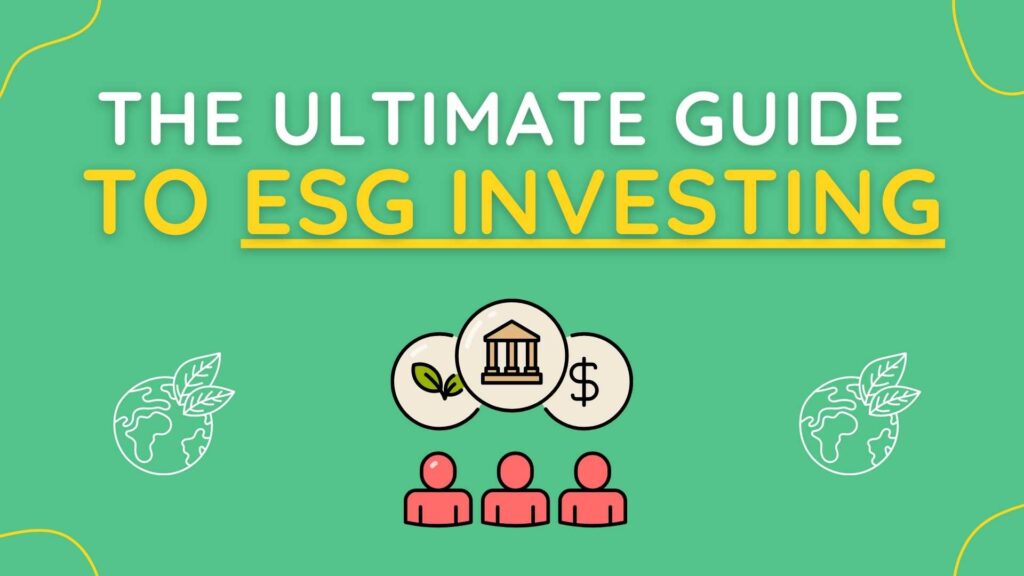
Sammie Ellard-King
I’m Sammie, a money expert and business owner passionate about helping you take control of your wallet. My mission with Up the Gains is to create a safe space to help improve your finances, cut your costs and make you feel good while doing it.
Socially responsible investing or ESG investing has grown in importance with millennials and Generation Z.
While there is more to ESG than social responsibility, it certainly plays a significant role in people’s investment decisions.
The reality of investing is that the money you put in gets used for someone else’s purposes. While the ultimate aim of investing is to see a return, people are growing more concerned about where their money goes in the meantime.
We will explore how ESG investing works and tthe pros and cons of socially responsible investing. We’re also going to consider if it has any positive impact on the planet or is simply a passing trend.
Table of Contents
What is ESG Investing?
Generally, when people are investing, they have one aim: to make a healthy return.
The traditional approach to investing is often seen as one where you make as much money as possible with little concern about exactly how this happens. Ethical investing considers a different approach.
Ethical investing means that investors have a goal on top of making a return. They want their money to be used for good and avoid any way their money could be used for harm.
Ethical and socially responsible investing is still about making money, but more focus is placed on how this is done.
Basic examples could see investors completely ignoring the tobacco, gambling, and weapons industries.
Listen to this podcast 👇🏼
In this episode we welcome Dan Sherrard-Smith, Founder of MotherTree. He joins us to give us a full guide to socially responsible investing and carbon footprint reductions.
We discuss the ins and outs of ESG investing, what green investing actually means, how you can take advantage of green investing and much more.
Hit the play button just below or click Dan’s name just above for links to Spotify and Apple podcasts.
How does ESG investing work?
ESG is about socially responsible investing. Before an investor decides to invest in a company, they will step back and consider its social and environmental impact.
There is an in-depth examination of how a company’s activities affect the world and the level of good and harm done.
When looking at how ESG investing works, it is essential to note that investors don’t just seek these opportunities from a moral standpoint.
The reality is that they present a great option. Why? Sustainable, well-managed, and socially responsible companies attract the best talent, so their longevity is almost assured.
ESG fund managers will carry out complete examinations of a company before investing in it.

What does ESG stand for?
When looking at ESG investing ETFs and stocks, it is worth exploring the term.
The letters ESG cover the three main factors taken into account when looking at the sustainability and impact of a business, and these are environmental, social and corporate governance.
Let’s break these down and look at them in more detail:
Environmental
When considering why ESG investing is important, its consideration of the impact on the environment is a huge factor.
With governments worldwide committed to reducing carbon emissions, ESG looks at a business’s carbon footprint and how it contributes to any form of pollution.
Consideration is given to how sustainable a business is and whether it uses renewable resources. There is also an examination of what a company does to offset any negative environmental impact that it may have.
Social
When looking at the social impact of a business, consideration is given to how diverse the workforce is. Conclusion: there is a look at the levels of inclusivity and its responsibilities towards its customers. Fund Managers and investors look at any corporate policies relating to these.
Corporate governance
This element examines the structure of a business and how it operates. It considers how employees are treated and if they are on a par with those that work at higher levels within an organisation.
Does ESG investing achieve its aims?
Plenty of evidence exists that shows that ESG investing works and achieves its aims. There is success in terms of delivering for investors but also in terms of promoting ethical practices.
It may seem that profitability and ethics don’t go hand in hand, but ESG investing has shown that this doesn’t have to be the case.
We have already considered how the world has come together to tackle climate change. This means that companies developing green technologies are attracting more investors and gaining a financial advantage.
ESG market growth has been substantial since the pandemic with the rise of the retail investor. The retail investor is generally someone who is young and therefore tends to be more socially responsible.
When it comes to ESG investing stocks, a fund manager will not just blindly invest in companies that have excellent ESG credentials. The first test will be profitability.
If this test is passed, only then will a Fund Manager explore the business’s ESG credentials. If these are up to scratch, then investments go ahead. ESG investors don’t have to sacrifice their profit to take an ethical approach.
Why ESG investing is important
If you are interested in socially responsible investing and investments that consider the environment, you’ll already know why ESG investing is important.
In short, it allows you to invest while at the same time supporting causes that you care about. Yes, investors are looking for a return, but ESG investing goes beyond just a monetary value.
Whenever anybody invests, they are investing in the future. The hope is that, in time, a company will become more valuable, and its shares will be worth more.
If we are investing in the future, we need to look at the future as a whole, including the world’s future, not just a company.
You could invest large sums of money into a company that ignores ESG principles. However, if everybody did this, what kind of world would be left at the end of it?
ESG investing takes a holistic approach that covers finances and the world’s well-being.
Is there a disadvantage to ESG investing?
It wouldn’t be fair if we didn’t propose a counterargument here.
Whilst this style of investing may all sound fantastic on paper; there are some important things to highlight.
One example is that many green energy stocks are highly volatile, and you’ll find that recent popularity has caused the stocks to hit astronomical valuations.
This is why it’s imperative when picking your investments to research and ensure the company is posting profits or is likely to be soon.
Another argument that goes against ESG investing comes in the form of oil companies. With the world transitioning to a carbon-free environment, it’s essential to recognise that the oil companies will have to play their part to get us there.
We require 57% more oil than we currently use to develop the technology to create carbon-free energy, and you cannot build without it.
So does that mean we shouldn’t invest in companies like Shell and BP? Maybe you’re so passionate about ESG that you can’t; that’s fair enough, but investing in ‘transition’ stocks is part of the process for some.
ESG investing - stocks and ETFs
If you’re looking at ESG investing right now, then investing in ESG funds is an excellent place to start. There are also ready made investment portfolios in what’s called ethical ISAs.
Run by investment managers, these funds carry out all required checks ensuring that the companies they invest in are ethical and environmentally friendly. Some good ones in the UK are Moneyfarm, Wealthify and Nutmeg.
Of course, you’re free to pick your stocks and EFTs to invest in, but going via a fund saves on some leg work.
While we can’t offer investment advice (and bearing in mind that past performance is no guarantee of what may happen in the future), some ESG funds that could be worth exploring include:
Trium ESG Emissions Impact Fund
Trium has centred around 20 long-term investments, and it targets companies that stand to see significant gains by cost-effectively reducing their carbon emissions.
How this fund is managed means that it is partially protected against the volatility that the stock market experiences.
iShares Global Clean Energy ETF (ICLN)
This fund is owned by the world’s largest investment company BlackRock. The fund is an index and tracks the S&P500 clean energy index selecting 30 clean energy-related businesses that operate in energy production or the technology required to support it.
You can invest directly into the fund with BlackRock, or it is available via most investment ISAs or brokers.
Vanguard FTSE Social Index Fund (VFTAX)
Investing with Vanguard can often be described as a safe bet. One of the largest and most trustworthy financial institutions has the Social Index Fund.

Do I need an IFA for ESG investing?
If you’re looking at socially responsible investing and exploring stocks and ETFs, you will find plenty of funds looking to take your money. The problem here is that it is not always easy to choose between them unless you are qualified in this field.
They will all have their ESG pros and cons, so differentiating between them is no easy task. You may opt to search online for information about these funds, but there is no real way to know how reliable or unbiased any information is.
An independent financial advisor (IFA) is entirely unbiased. They are there to act in your interests alone, which means that you can rely on their advice. There is no risk of their being an ulterior motive when they recommend one ESG fund over another.
Yes, an IFA will charge for their advice, but this is money well spent if you don’t have the time to research your investments.
They have the experience and knowledge to identify good funds, and this can see you making much better returns on your money. Going it alone, while doable, can carry more risks.
Are there different kinds of ethical investments?
The kind of ethical investing that you opt for will depend upon how strict you want to be. It could be enough to avoid specific industries, such as tobacco and gambling, or to stay away from certain business practices.
If this is the case, socially responsible investing (SRI) will suffice. SRI funds won’t necessarily exclude whole industries. Instead, they will look at individual companies within those industries and see if they are more responsible than similar ones.
If the above approach isn’t enough for you, the entirely ethical funds may be the way forward. ESG funds ensure that all ESG criteria are considered before any investments are made, and these funds are much stricter.
There is also ‘passive’ ethical investing to consider. With this approach, investments are made, and then, with the fund being the major shareholder, it tries to enforce change from within. The issue here is that there’s no guarantee of success.
How can you choose suitable ethical investments?
Now that you know more about how ESG investing works, you may be wondering how you can identify the opportunities that are right for you.
A significant point here is that you need to come first! You are looking for a return on your money and are not making a charitable contribution.
When it comes to ESG funds, be sure that they are as ethical as they claim to be. Check out their holdings and ensure that any investments align with your morals and beliefs.
ESG investing pros and cons
As with any investment, there are pros and cons to be aware of. Indeed, when looking at the pros of ESG investing, there is more to this than just responsibility.
You’re likely to find that ethical industries are attracting government subsidies, accelerating their growth and bringing more profits. You will also find that these companies tend to be stable and less prone to volatility.
In terms of cons, there is nothing to suggest that ESG investing brings lower returns.
However, you are faced with fewer investment opportunities as many companies will not meet the criteria so it’s important to look at an ESG investing strategy if you want to invest.
It is also the case that ESG funds tend to attract higher management fees as managers are compensated for the time it takes to carry out the necessary research.
Final thoughts
Socially responsible investing is hugely important and necessary for the long-term good of the world. However, your approach to investing must still take the potential results into account.
Just because a company may align with your values, it is not necessarily a great investment opportunity.
It is vital to be led by your head when making financial decisions, even when it comes to saving the planet. Allowing your heart a moral compass to rule will not lead to the best results and could cost you!
Share this article with friends
Disclaimer: Content on this page is for informational purposes and does not constitute financial advice. Always do your own research before making a financially related decision.


